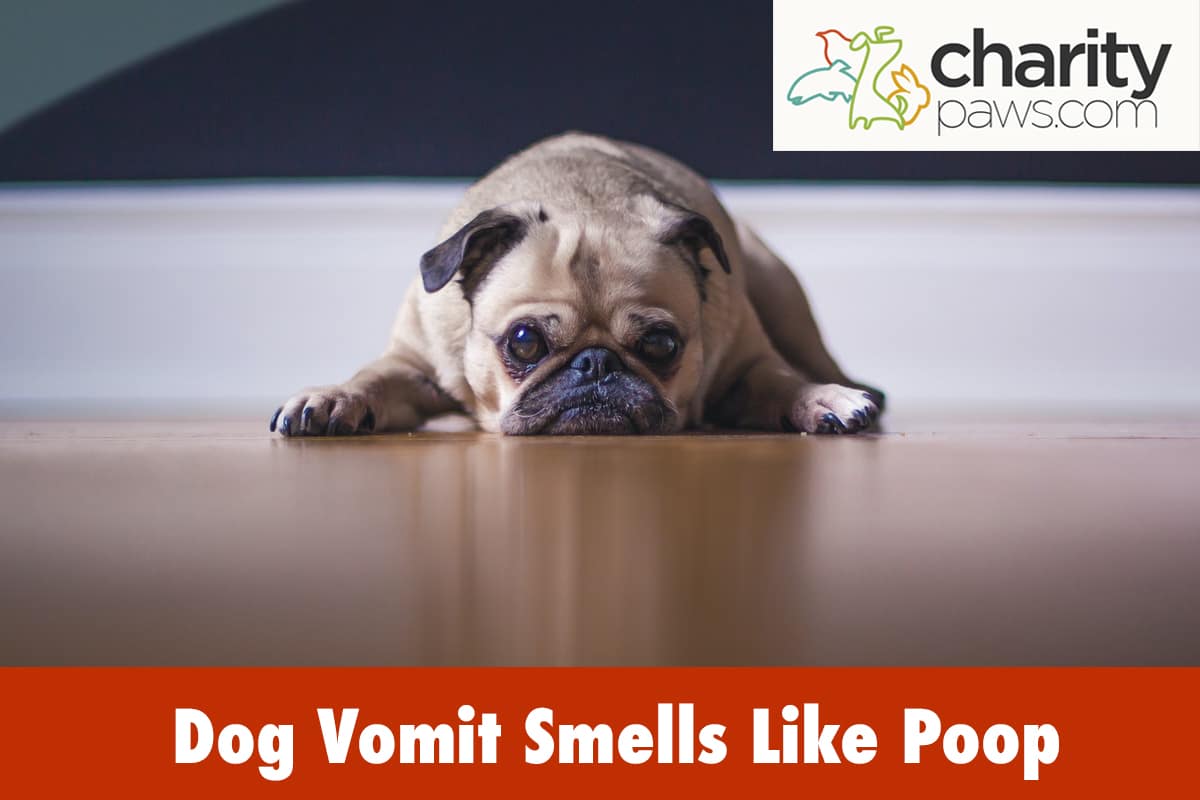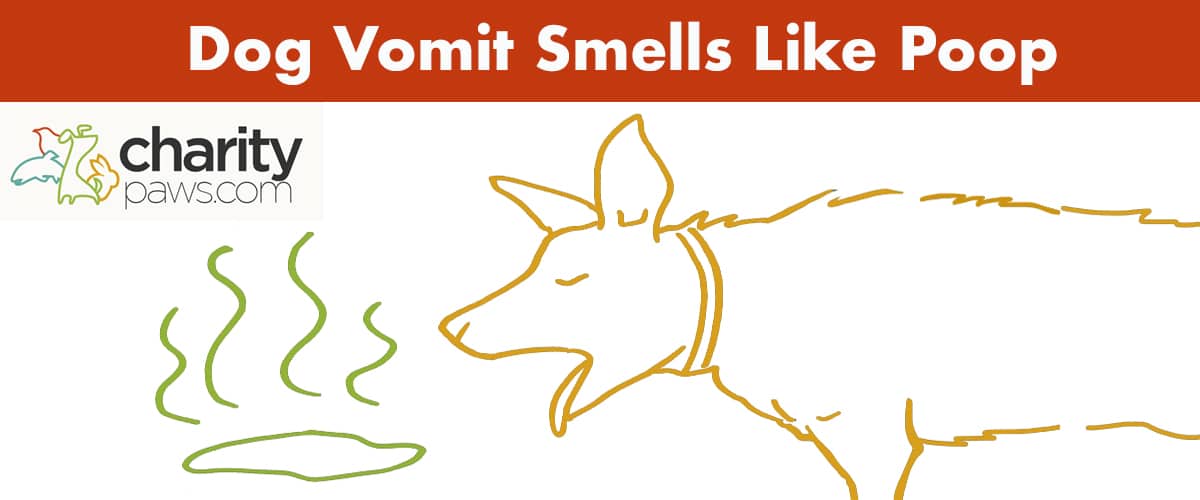Dog vomit is unpleasant at the best of times, but even worse when it smells like poop.
You should pay attention to the fact it smells extra bad as it could be a sign of something serious going on.
Let’s look at some of the most common reasons why your dog’s vomit might smell like feces and what you should do to help your pet.
What Could Cause Dog Vomit To Smell Like Poop

There are several reasons why your dog’s vomit may smell like poop.
Let’s take a look at each of those in turn:
Your Dog Has A Bowel Obstruction
If your dog’s vomit smells like feces then it could be due to an obstruction in his bowel.
Dogs are notorious scavengers and will often eat things they should not.
However, if the thing he has eaten is undigestible, then it could cause real problems.
Items that cannot be broken down and are too big to pass through your dog may become lodged in their digestive tract, acting as a ‘foreign body’.
This stops material from being able to travel through the intestines as normal, meaning it may be vomited back up again.
Obstructions lower down in the digestive tract are more likely to result in partially digested material that smells like feces being brought up.
What Things Can Cause A Bowel Obstruction?
Common foreign bodies include:
- Stones
- Fruit pits
- Corn-on-the cob
- Small children’s toys or pieces of broken dog toys
- Pieces of bedding, towels, or socks (socks being a common culprit)
- Bones
- Christmas decorations
If your dog has a blockage in its digestive tract then this is an emergency that requires prompt treatment by a veterinarian, otherwise, your dog could become seriously unwell.
What Are The Other Symptoms Of Bowel Obstruction?
As well as vomiting (which may or may not smell like poop), he may be showing the following signs such as:
- Diarrhea, or constipation
- Abdominal pain
- Lethargy
- Inappetence (lack of appetite)
What Will My Veterinarian Do?
Your veterinarian will start by examining your dog.
They may decide to do some further tests to help make a diagnosis.
They will often run some bloodwork to check your dog’s biochemistry and hematology, looking for markers of inflammation and infection, as well as checking liver, kidneys, and blood sugar levels.
Diagnostic imaging such as X-rays and ultrasound are performed to look at your dog’s digestive tract for clues of an obstruction.
Sometimes the issue is obvious, bone or metal for example will show up well on x-rays.
Other things like socks or pieces of bedding may not be that clear though, so your vet will look for things like a build-up of gas in the intestines instead.
If your vet thinks it’s likely there is a blockage then exploratory surgery will be performed to remove it.
They will assess the intestines for damage, as sometimes surgical removal of diseased areas of the gut is needed too.
Many dogs do well with swift treatment but there is always the risk of complications with this type of major surgery.
Try and prevent accidents from happening in the first place by not encouraging your dog to play with unsafe items, avoiding feeding them inappropriate items (like bones, or bits of corn-on-the-cob), and by assessing their toys and bedding regularly for damage.
Your Dog Is Eating Their Own Poop
As disgusting as it sounds, some dogs will eat their own poop.
This behavior is called coprophagia.
So, if your dog vomits and it smells like poop, it could be because that’s what they have recently eaten.
Some dogs will also eat other animal poop such as, cat poop, rabbit poop and other dogs’ poop.
Why Would My Dog Eat His Own Waste?
There are many reasons why your dog might eat his own feces.
These include:
- Behavioral – some dogs will do it out of boredom, because of a previous abusive home, or because they feel shameful and want to hide the evidence if they have had an accident. Some dogs will also develop this habit as a way of seeking attention. Others just simply seem to enjoy doing it. One theory is that it is a tendency inherited from their wolf ancestors.
- Malabsorption issues – undigested food in the poop can make it smell and taste more attractive to dogs.
- Dietary deficiencies – if your dog is on a poor quality or incomplete diet then he may resort to eating his own feces to try and obtain more nutrients.
How Do I Stop My Dog From Eating His Poop?
If your dog is eating their own poop, and occasionally vomiting it back up again, then you will probably want to try and stop this behavior.
Supervise your dog when he is out pooping, ideally keeping him on a leash and moving him away from the poop as soon as possible.
Pick up any waste in your garden as soon as he produces it, do not leave any lying around.
Consider getting your dog checked out by your vet if you suspect an underlying digestive issue or nutrient deficiency.
Over-the-counter products are available that you can add to your dog’s food that are said to make his stools taste less palatable to him.
It could help put him off eating his own waste.
Seek help from a qualified pet behaviorist if you are having issues with your dog’s behavior.
If they are showing other signs of anxiety or attention-seeking behavior, then you may need to tackle underlying issues to solve the problem.
Your Dog Is Eating Other Animal’s Poop
Just as some dogs like to eat their own poop, others like to eat waste that has been produced by different animals.
This could be a cat, rabbit, horse, cow, fox, or other dogs’ poop.
The term coprophagia is also used to describe animals that do this, as well as those that eat their own waste.
Your dog risks picking up parasites, bacterial and viral infections through this unhygienic habit.
How Do I Stop My Dog From Eating Other Animals’ Poop?
One of the most common problems is dogs eating cat poop from the litter box indoors.
If you have a cat, then try and house their litter box out of reach of the dog, either in an area of the house that the dog isn’t allowed or up high on a surface that they cannot reach.
As well as eating cat poop, many dogs accidentally eat some of the kitty litter as well which is likely to irritate their digestive tract, or even worse, a blockage if they eat a large amount.
Cat litter swells as it absorbs moisture and if this occurs in your dog’s intestines then they could become obstructed.
If your dog is eating the manure from other animals while out walking, this can be trickier to control.
A basket muzzle may be needed for some dogs.
These types of muzzles allow your dog to pant and breath freely, but stop him from eating things he should not.
Training your dog to come back when called will mean you can call him away from any tempting feces while walking.
Your Dog Is Constipated
Severe constipation could act in the same way as an intestinal obstruction.
The impacted stools will form a blockage in your dog’s digestive tract, meaning that any food or digested material is unable to pass through.
This will cause your dog to feel uncomfortable, bloated and could lead to vomiting.
This vomiting may smell like poop as he is unable to pass digested food and fecal material in the normal manner.
Why Might My Dog Be Constipated?
Dogs can be constipated for several reasons, including:
- An inappropriate diet – a diet too low in fiber or that contains lots of undigestible material like bones could lead to constipation.
- Health complaints – an enlarged prostate, a tumor or enlarged lymph nodes could all cause your dog’s back passage to become narrowed leading to difficulty passing feces.
- Lack of exercise – exercise is important to help with normal digestive transit, just as it is with people.
- Injury – A broken pelvis or spinal injury could affect your dog’s ability to pass stool.
- Medication – the side effects of some medications may make your dog more prone to constipation. Always speak to your vet, before stopping or adjusting your dog’s medication.
- Dehydration – If your dog becomes dehydrated he will be more at risk of constipation.
What Is The Treatment For Constipation?
If your dog is constipated to the point that he is being sick, then he needs immediate veterinary attention.
Your dog will be examined initially but may also need diagnostics to confirm that constipation is the cause of his symptoms.
When dogs are badly impacted with firm stools, they usually require an enema to relieve the obstruction.
Warm water and lubricants will be gently passed into your pet’s back passage under anesthesia to help break up the hard feces.
Your vet will be able to advise you further on the likely cause of your dog’s constipation and make some suggestions for treatment or a change of diet going forwards.
Your Dog Has Internal Bleeding
If your dog is vomiting black material (which may or may not smell foul), then this could be a sign of internal bleeding.
A bleed from inside the stomach could mean your dog is digesting his own blood.
This digested blood usually appears dark in color rather than bright red, with some people describing it as looking like coffee grounds.
What Could Cause A Bleed Inside The Stomach?
Bleeds in the stomach usually occur because there has been damage to the inside of the stomach wall/lining.
This could be from something like a gastric ulcer, a sharp foreign body like a bone or piece of plastic, a mass or tumor that is bleeding, eating something toxic, or a severe medication side effect.
Do I Need To Take My Dog To The Vet If I See Black Vomit?
Yes, you must get your pet seen as soon as possible if they are vomiting digested blood.
This usually indicates a serious underlying condition that needs prompt investigation.
Your vet will be able to advise you on treatment options depending on their findings.
Is It Possible To Vomit Poop

It is uncommon for dogs to vomit up actual feces, but it can happen in some extreme cases.
It is more likely to occur when a dog has a serious obstruction in its lower intestines.
Usually, though, a dog’s vomit can smell foul due to the type of food it has been eating and because of changes in bacteria levels in its digestive tract.
This is because the partially digested material has been sitting in there going stagnant and unable to pass for a while, with bacteria levels multiplying.
If your dog has eaten something particularly disgusting like a rotten carcass this could add to the odor of his vomit too.
Other infectious agents can also be a contributing factor to the smell.
Viral infections like parvovirus could cause your dog’s vomit to have more of an odor.
Do not forget that there are also many reasons why your dog’s vomit may appear brown, which may or may not be related to feces:
- They have eaten kibble that is dyed brown or dark red
- They have been eating poop (their own or other animals)
- They have been eating grass and dirt in the garden
- There is digested blood in their vomit
- They have eaten something they should not have (like chocolate)
If you still aren’t sure whether your dog is vomiting up poop or if it is something else, you should get him checked out by your vet.
Is Vomiting Poop An Emergency
It can be an emergency if your dog is vomiting poop.
If you know they have got a habit of eating feces and just brought it back up again, then clearly this is not an emergency, as long as your dog is otherwise well.
But if your dog is vomiting up their own fecal material then this will require an urgent trip to your veterinarian.
Dogs that are being sick with foul-smelling vomit can be quite unwell.
They may also be constipated, have a bloated, painful abdomen, and could be lethargic too.
Without prompt treatment, these animals could deteriorate quickly and even die.
Conclusion
If your dog’s vomit smells like feces, then there are several reasons why this might be.
If your dog seems unwell then you should always get him checked over by a veterinarian, in case there is something serious going on.
Prompt treatment leads to better outcomes, so it’s best to get him seen if you are worried.

